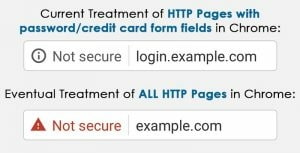Updating Your Site to SSL

On February 8, 2018, Google released a statement that its Chrome 68 update – to be released in July 2018 – will increase web security by clearly marking all HTTP (non-HTTPS) sites as not secure in Google Chrome. If your website is currently HTTP (not secure), it’s recommended switching to HTTPS as soon as possible by getting an SSL certificate through a certification authority. Otherwise, Google will mark your website as potentially dangerous this year, and the notice will be featured prominently right in the Chrome search bar.
Benefits of Switching to HTTPS
In a recent HubSpot Research study, more than 80 percent of Chrome users said they wouldn’t continue browsing a site that had a “Not Secure” notice on the search bar. Switching to HTTPS will establish your website and brand as trustworthy for customers and search engines, so your domain will have a better chance of engaging visitors and ranking well in search results.
From a technical standpoint, SSL encrypts your site so your content won’t be stealthily altered, and it protects users’ personal information as they navigate your pages. You can read more about those benefits here.
Google Chrome is the most popular web browser in the world, and its influence is great. The benefits of making your website secure will only grow as web users become more accustomed to choosing only secure websites.
How to Get an SSL Certificate
SSL certificates are affordable and can even be free, depending on compatibility with your domain host and the level of validation needed. If you have a hosting or maintenance retainer with us, we can get you started with a secure site. Otherwise, your host may provide certification, or you can get an SSL certificate from a trustworthy certification authority (CA) like DigiCert or Let’s Encrypt. After you’ve made the switch to HTTPS, it’s important to update your sitemap and resubmit it to search engines, update your robots.txt file and any old 301 redirects, and update your default URL in Analytics and any webmaster tools you use.
Talk to your developer or IT provider about making your website secure, and please contact us if you need assistance or have any questions.
